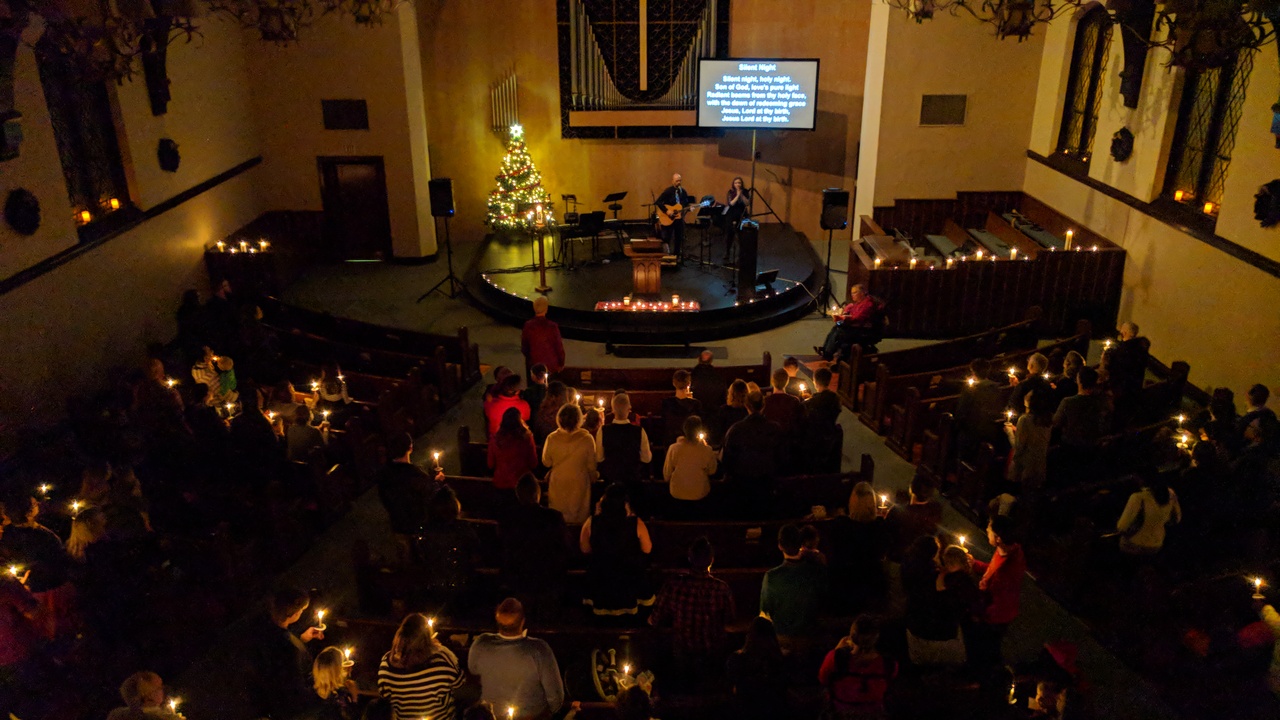Christmas Eve Service at Trinity City Church in 2022.
In the church calendar, the season of Advent begins on Sunday, December 3rd and ends on Christmas Eve (Dec. 24th). The season of Christmas begins on December 25th and lasts until January 5. This year, Christmas Eve falls on a Sunday. Trinity City Church will not have a morning service on Christmas Eve (no 10am gathering) but we will be gathering for a Christmas Eve service at 5pm.
In order to help us prepare for this season, here are descriptions of each season and a new series of resources from The Fullness of Time Series.
Advent
Here is how The Worship Sourcebook describes the season of Advent:
The great proclamation “The Word became flesh and made his dwelling among us” (John 1:14) assures us that God has entered into human history through the incarnation of the Son. The season of Advent, a season of waiting, is designed to cultivate our awareness of God’s actions—past, present, and future. In Advent we hear the prophecies of the Messiah’s coming as addressed to us—people who wait for the second coming. In Advent we heighten our anticipation for the ultimate fulfillment of all Old Testament promises, when the wolf will lie down with the lamb, death will be swallowed up, and every tear will be wiped away. In this way Advent highlights for us the larger story of God’s redemptive plan.
A deliberate tension must be built into our practice of the Advent season. Christ has come, and yet not all things have reached completion. While we remember Israel’s waiting and hoping and we give thanks for Christ’s birth, we also anticipate his second coming at the end of time. For this reason Advent began as a penitential season, a time for discipline and intentional repentance in the confident expectation and hope of Christ’s coming again.
Christmas
In addition, The Worship Handbook on the meaning Christmas:
At Christmas, we remember and celebrate the nativity of Christ and the mystery of the incarnation. Whereas during Advent we anticipate the fulfillment of the Old Testament prophecies of the Messiah, at Christmas we identify with the angels who proclaimed, “Glory to God in the highest”; with the shepherds, who were afraid but nevertheless offered worship; and with Mary, who pondered the meaning of these events in her heart (Luke 2:13-20) [...]
The Christmas season extends from December 25 through January 5 and includes at least one and usually two Sundays. Celebrating Christmas as a season helps us both to enter into the meaning of the incarnation more fully than celebrating a single day and to focus on additional Scripture texts that explore the meaning of Christmas beyond the familiar words of Luke 2.
Though North American culture considers Christmas the most important day of the Christian year, we must be careful to see the significance of Christmas in the light of all that follows, particularly Easter. In fact, Christmas is the first in a series of celebrations (Christmas, Epiphany, the baptism of our Lord, and the transfiguration of Jesus) that affirm the identity of Jesus as not only fully human but also fully divine. If the intervening weeks between these celebrations focus on the remarkable content of Jesus’ teaching and the relationships he established with his disciples, these four events anchor the church’s reflection on the meaning of Jesus’ life for our understanding of God and of the coming kingdom. Together, these celebrations prepare us for the journey toward the cross and the empty tomb.
Advent & Christmas books
The church calendar is a way for Christians to remember the gospel story each year. “The Fullness of Time series invites readers to explore the riches of the church year, guided by some of our finest church theologians. Each volume introduces the traditions, prayers, Scriptures, and rituals of a season of the church—not as an academic exercise, but as an reflections on the theological and spiritual treasures of the church calendar” (from the publisher). To prepare for this season, consider the books that cover Advent and Christmas.
Source: ivpress.com
Source: ivpress.com
May this season of Advent and Christmas bring you closer to the Lord through a time of anticipation and celebration.







